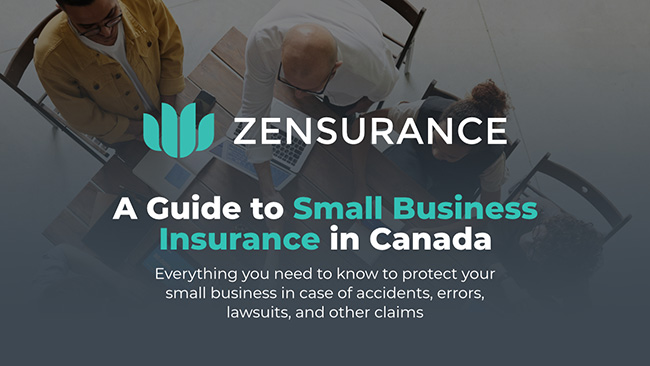The construction world’s unsung heroes are self-employed tradesmen, including electrical contractors, plumbers, builders, and roofers.
They play a vital role in constructing everything from large industrial complexes and commercial properties to residential communities. Many also serve as independent tradespeople helping residential homeowners fix or improve their properties.
According to Statistics Canada, an average of 2,652,600 people were self-employed, making up 13.2% of the employed population in 2023. Meanwhile, Statista, a research firm, estimates about 1.69 million construction workers were employed or self-employed in Canada in 2022.
Whether legally required to or not, these professionals need insurance for trades to protect themselves and their tools and equipment from damage and loss.

What Is Tradesman Insurance?
Tradesman insurance is a general term describing a business insurance policy geared towards self-employed tradespeople or owners of a small construction company.
It combines different coverages in one policy to protect their tools, equipment, and construction projects and provide financial support for third-party bodily injury or property damage claims.
Tradesman insurance can be tailored to meet the specific requirements of your trade, regardless of whether you are working independently on a private job, as a subcontractor on a larger project, or providing consulting services.
Why Do Self-Employed Tradespeople Need Insurance?
There are several reasons why self-employed tradesmen require insurance protection. Among those reasons:
It’s Required
Either by law (as is the case with some trades, like electricians) or as a project requirement, if you’re hired as a subcontractor to work at a job site, you need coverage to enter the site or get paid for your work.
For Licensing
Licensed tradespeople are usually required to carry a certain amount of liability insurance to maintain their licences.
For Income Protection
A tradesman’s income is linked directly to their line of work. One third-party lawsuit – even a frivolous one without merit – could wipe out your savings, thrust you into bankruptcy, and damage your reputation.
What Insurance Coverages Should a Tradesman Have?
What a customized tradesman insurance policy includes depends on multiple factors, including the type of work you do, where you work, and the risks your work entails.
Generally, your policy will compensate you for costs related to claims you file, including replacing stolen tools, paying for a third party’s medical expenses, or covering legal defence fees.
A skilled tradesperson’s policy should have these six main types of insurance:
1. Commercial General Liability (CGL) Insurance
CGL, or general liability insurance, is the most common protection self-employed tradesmen have in their policies. It shields you from third-party bodily injury and property damage claims related to your work or which result from an accident.
Since you work in skilled trades and on construction sites, including builders’ risk insurance in your policy may be worthwhile. It covers your entire project, including the structure you’re building or working on and the materials at the job site if losses or damages occur because of fires, water damage, theft, or vandalism.
2. Tools and Equipment Insurance
How can you do your job without your tools and equipment? The high-quality tools and equipment tradespeople use are specialized and expensive. Tools and equipment insurance covers your costs if your tools are stolen, vandalized, or damaged by water or fire.
3. Professional Liability Insurance
Also called errors and omissions (E&O) insurance or tradesmen indemnity insurance, professional liability coverage protects you from allegations or claims of negligence, misrepresentation, mistakes, and failing to deliver a service as promised. If you offer assessments, or make a mistake that costs your client money, they could pursue you legally for damages. Professional liability coverage provides funds for your legal costs and damages a client suffers from your services.
4. Installation Floater Insurance
Installation floater insurance helps fill a gap in your overall policy by covering your client’s materials before and during an installation job, including when it’s in transit. It’s designed to reimburse you for client materials or property that are damaged, lost, or stolen until the final installation of those materials is completed.
5. Pollution Liability Insurance
As a tradesman, you may be contractually required to carry pollution liability insurance. If not, it’s still wise to include it in your policy. It covers the costs of third-party bodily injury, property damage, and environmental damage caused by your work, whether gradual or sudden.
6. Commercial Auto Insurance
Commercial auto insurance is essential for skilled tradespeople who travel for work, as private-passenger car insurance does not cover vehicles used for business. Unlike private-passenger car insurance, commercial auto insurance offers higher coverage limits and covers a wider range of vehicles.
How to Get Low-Cost Business Insurance for Skilled Trades
Getting tradesmen insurance to protect your finances and reputation isn’t as tough as nails with Zensurance. We’re Canada’s leading business insurance provider, protecting hundreds of thousands of small businesses and independent professionals across hundreds of industries.
Fill out our online application for a free quote.
With over 50 insurance providers in our partner network, we can find the comprehensive but affordable policy you need.
– Updated March 28, 2025.
Sign Up for ZenMail
"*" indicates required fields
Recent Posts
What Type of Insurance Does a House Cleaner in Canada Need? (Coverage Explained)
House cleaners provide an essential service to Canadian households, but even small accidents can lead to costly claims. Here’s the insurance coverage professional house cleaners in Canada need to protect their businesses and income.
What Is Hired and Non-Owned Commercial Auto Insurance?
If your business rents or leases vehicles, or if employees use their own cars for work, hired and non-owned commercial auto insurance can help protect your business from costly accidents and liability claims. Here’s what Canadian business owners need to know.
What Is a Deductible in Small Business Insurance? (Definition, Examples & How It Works)
A deductible is the amount your small business pays out of pocket when you file an insurance claim. Understanding how deductibles work can help you lower premiums, avoid surprises, and choose the right coverage.









